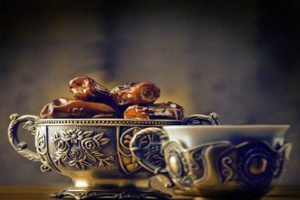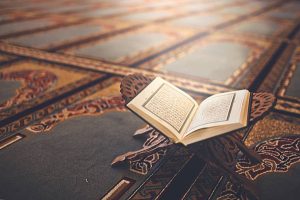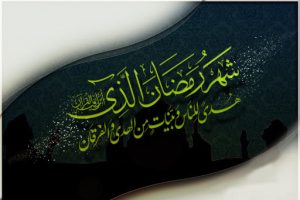
1. The best clothing for a Muslim is that which is worn by the pious and righteous.[1]
عن ابن عمر قال: قال رسول الله صلى الله عليه وسلم: من تشبه بقوم فهو منهم (سنن أبي داود، الرقم: ٤٠٣١)[2]
Hazrat Ibnu Umar (radhiyallahu ‘anhuma) reports that Hazrat Rasulullah (sallallahu ‘alaihi wasallam) said, “The one who emulates a people will be counted from amongst them (in the court of Allah Ta‘ala).”
2. Do not wear tattered and torn clothing. If the clothing is torn, then it should be mended or patched. If Allah Ta‘ala has provided a person with wealth, then out of shukr (gratitude) to Allah Ta‘ala, he should wear clothing of a good quality. However, if one has not been blessed with wealth, then he should wear clothing according to his means.[3]
عن عمرو بن شعيب عن أبيه عن جده قال: قال رسول الله صلى الله عليه وسلم: إن الله يحب أن يرى أثر نعمته على عبده (سنن الترمذي، الرقم: ٢٨١٩، وقال: هذا حديث حسن)
Hazrat Abdullah bin Amr (radhiyallahu ‘anhuma) reports that Hazrat Rasulullah (sallallahu ‘alaihi wasallam) said, “Certainly Allah Ta‘ala loves to see the signs of His bounties on His servants.”
عن أبي الأحوص عن أبيه قال: أتيت النبي صلى الله عليه وسلم في ثوب دون فقال: ألك مال؟ قال: نعم قال: من أي المال؟ قال: قد آتاني الله من الإبل والغنم والخيل والرقيق قال: فإذا آتاك الله مالا فلير أثر نعمة الله عليك وكرامته (سنن أبي داود، الرقم: ٤٠٦٥، وسكت عليه هو والمنذري)
Abul Ahwas (rahimahullah) reports from his father: I went to Rasulullah (sallallahu ‘alaihi wasallam) while I was wearing clothing of inferior quality. He asked me, “Do you possess wealth?” I replied in the affirmative. He asked, “From which types of wealth?” I replied, “Allah Ta‘ala has blessed me with camels, horses and slaves.” Rasulullah (sallallahu ‘alaihi wasallam) then said, “When Allah Ta‘ala has blessed you with wealth, then the signs of the bounty of Allah Ta‘ala upon you and His generosity should be seen.”
3. There is no harm in one wearing good clothing. However, one should refrain from wastage and extravagance, and wearing clothing for show and to impress others.[4]
وقال النبي صلى الله عليه وسلم: كلوا واشربوا والبسوا وتصدقوا في غير إسراف ولا مخيلة (صحيح البخاري تعليقا ١٤٠/٧)[5]
Hazrat Abdullah bin Amr (radhiyallahu ‘anhuma) reports that Hazrat Rasulullah (sallallahu ‘alaihi wasallam) said, “Eat, spend in charity and adorn yourself with clothing, but do not waste nor carry out actions for show.”
وقال ابن عباس: كل ما شئت والبس ما شئت ما أخطأتك اثنتان: سرف أو مخيلة (صحيح البخاري تعليقا ١٤٠/٧)
It is reported that Hazrat Ibnu Abbaas (radhiyallahu ‘anhuma) said, “Eat what you wish and wear what you wish, as long as you refrain from two things; wastage and show.”
4. The kurta, topi and imaamah (turban) are among the sunnah attire for men. It is reported in the Ahaadith that Hazrat Rasulullah (sallallahu ‘alaihi wasallam) and the Sahaabah (radhiyallahu ‘anhum) used to wear kurtas, topis and imaamahs.[6]
عن أم سلمة قالت: كان أحب الثياب إلى النبي صلى الله عليه وسلم القميص (سنن الترمذي، الرقم: ١٧٦٢، ١٧٦٣ وقال: هذا حديث حسن غريب)
Hazrat Ummu Salamah (radhiyallahu ‘anha) reports that the most beloved garment to Rasulullah (sallallahu ‘alaihi wasallam) was the qamees (kurta).
عن أبي المتوكل أنه: رأى ابن عمر إزاره إلى نصف ساقه وقميصه فوق ذلك ورداؤه فوق القميص (المعجم الكبير للطبراني، الرقم: ١٣٠٧٧)[7]
Hazrat Abul Mutawakkil (rahimahullah) reports that he had seen Ibnu Umar (radhiyallahu ‘anhuma), and his lungi reached half his shin and his kurta reached above that (i.e. it was higher than the lungi), and the shawl he was wearing was higher than the kurta.
عن أبي هريرة رضي الله عنه قال: كان لرسول الله صلى الله عليه وسلم قلنسوة شامية وفي رواية: عن عطاء عن أبي هريرة رضي الله عنه قال: كان لرسول الله صلى الله عليه وسلم قلنسوة بيضاء شامية ( مسند الإمام الأعظم، كتاب اللباس والزينة صـ ٢٠٤)[8]
Hazrat Abu Hurairah (radhiyallahu ‘anhu) reported that Nabi (sallallahu ‘alaihi wasallam) had a Syrian topi. In another narration, Hazrat Abu Hurairah (radhiyallahu ‘anhu) reported that Nabi (sallallahu ‘alaihi wasallam) had a white Syrian topi.
وقال الحسن: كان القوم يسجدون على العمامة والقلنسوة ويداه في كمه (صحيح البخاري تعليقا ٨٦/١)
Hazrat Hasan Basri (rahimahullah) says, “The Sahaabah (radhiyallahu ‘anhum) would make sajdah during salaah on their turbans and topis.”
5. Men should not wear clothing that is tight fitting or body hugging. Rather, men should wear loose, flowing clothing.[9]
[1] (والقطن عندي أفضل) أي من الكتان لأنه لباس الصالحين (منحة السلوك في شرح تحفة الملوك صـ ٤٧٩)
[2] وسنده صحيح كما في المغني عن حمل الأسفار في الأسفار ٢١٧/١
[3] (واللبس على ثلاث مراتب فرض) أي المرتبة الأولى فرض (وهو قدر ما يستر بدنه ويدفع عنه ضرر الحر والبرد) لما مر أن صون نفسه عن الهلاك فرض (من وسط ثياب القطن والكتان) لأن الخير في الوسط لأنه إذا لبس دنياً من كل وجه تحقره العيون وإذا لبس نفيساً من كل وجه يصير علماً بين الناس فيختار الوسط (والقطن عندي أفضل) أي من الكتان لأنه لباس الصالحين (ومستحب) أي المرتبة الثانية مستحب (وهو لبس الثياب الجميلة للتجمل والتزين وإظهار نعمة الله) لما روي أنه عليه السلام كان له صوف وعلى كمه علم حرير وروي أن أبا حنيفة ارتدى برداء قيمته أربعمائة دينار وروي أنه عليه السلام قال إن الله يحب أن يرى نعمته على عبده رواه الترمذي (منحة السلوك في شرح تحفة الملوك صـ ٤٧٩)
اعلم أنه لا تلازم بين قصد الجمال وقصد الزينة فالقصد الأول لدفع الشين وإقامة ما به الوقار وإظهار النعمة شكرا لا فخرا، وهو أثر أدب النفس وشهامتها (رد المحتار ٤١٧/٢)
[4] قال الولوالجي في فتاويه لبس الثياب الجميلة مباح إذا كان لا يتكبر لأن التكبر حرام وتفسيره أن يكون معها كما كان قبلها اهـ (البحر الرائق ٣٠٢/٢)
[5] سنن النسائي، الرقم: ٢٥٥٩
[6] روى الشيخ ابو الحافظ الاصبهاني بإسناده في شروط أهل الذمة عن خالد بن عرفطة قال كتب عمر رضي الله عنه الى الأمصار في حق النصارى أن لا يلبسوا لبسة المسلمين حتى يعرفوا (اقتضاء الصراط المستقيم ٣٦٦/١)
قال ابن العربي: القلنسوة من لباس الأنبياء والصالحين والسالكين تصون الرأس وتمكن العمامة وهي من السنة (فيض القدير ٢٤٦/٥)
[7] ورجاله كلهم من رجال البخاري أو مسلم إلا معاذ بن المثنى، قال عنه الذهبي في السير ٥٢٧/١٣: ثقة متقن
[8] ورجاله ثقات
[9] وعلى هذا لا يحل النظر إلى عورة غيره فوق ثوب ملتزق بها يصف حجمها (رد المحتار ٣٦٦/٦)
 Ihyaaud Deen An Effort to Revive Deen in Totality
Ihyaaud Deen An Effort to Revive Deen in Totality



